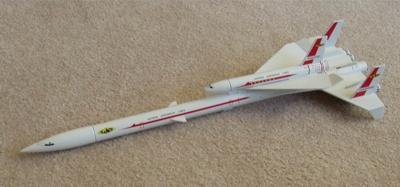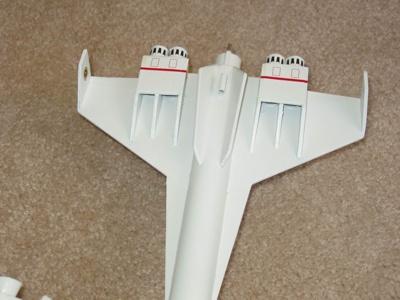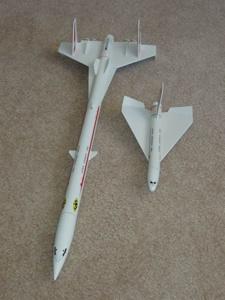| Manufacturer: | LawnDart Rocketry  |

(Contributed - by Mike Goss - 12/10/02)
 Introduction:
Introduction:
LawnDart Rocketry’s Piggyback Shuttle kit is a virtual clone of the wildly
popular Estes Orbital Transport. Unopened Orbital Transport Kits often sell for
over $100 on the popular Auction sites. This kit is Number 2 in their series of
“Retro Rockets” that are copies of some of the more popular old kits.
The kits come with everything that you need to make the rocket, and incorporate
several of the new improvements seen in modern rocket kits. The only thing
missing are the decals. This is a challenging kit, and I would rate it a 3 on
the Estes scale of one to four.
Construction
I received the Piggyback Shuttle along with a couple other rockets from
LawnDart Rocketry in a very long thin cardboard box that was perfect to prevent
any shipping damage to the kits inside. The service and the response of
LawnDart was great, a very good company to work with. A quick check of the kit
assured me that all of the parts were there, in good shape, and nothing was
broken. The kit includes several body tubes of different sizes and lengths for
the main booster and spacecraft as well as the scramjet engines, two balsa nose
cones, three sheets of balsa wood for the fins, a motor mount, Kevlar for the
shock cord, a Pratt Hobbies Heatshield Parachute Protector, and an 18"
Aerospace Specialty Products (ASP) parachute kit.
Unfortunately after I started construction I noticed that the ends of the body tubes for the scramjets and the body of the glider were not cut square. I then had to sand them square. However this frayed the ends of the tubes so I used some thin CA cement wicked into the ends of the tubes to strengthen them and then proceeded to finish sand the tubes square.
 The instruction included in the kit are
printed on 5 double-sided sheets of 8.5 x 11 paper. The instructions follow
closely the original instructions that can be found on JimZ’s website. The
instructions are in a logical order, and there is a template sheet for the fins
and for marking the fins and for setting the flap angle on the glider.
The instruction included in the kit are
printed on 5 double-sided sheets of 8.5 x 11 paper. The instructions follow
closely the original instructions that can be found on JimZ’s website. The
instructions are in a logical order, and there is a template sheet for the fins
and for marking the fins and for setting the flap angle on the glider.
At this point before you start the kit, go to JimZ’s site and download the Estes instruction set. The first step of the instructions calls out for, “two pattern sheets for the wings, rudders, fins and other balsa parts. One is for the 1/16" balsa and one is for the 3/32" balsa.” Unfortunately these are not in the kit, or on the instruction sheets. I pulled my copy of the old instructions and noted that Figure 4 is what they are referring to. Without this figure there is no way to get the proper balsa pieces cut out of the appropriate sheet. As a result, I used the old Estes instructions side by side with the Lawndart instructions throughout the entire build of the kit. Follow the instructions through the assembly of the motor mount, up to step 5.
In step 5 you will need to glue the Scramjet engines together, and then sand the ends until they are even. You will only need to do this on one end as the other end is buried in a box on the wing and is not seen.
Continue to follow both instructions as the Estes instructions are more illustrated and will help in any placement questions that you might have. Take care in steps 8 through 12 in the assembly of the scramjet housings. Test fit all of the parts before gluing. In step 14 you are instructed to peel off layers of the centering rings until the motor mount fits. This Gotcha is that two layers are not enough and three are too much. So carefully remove two layers, and sand the rings for a snug fit. Test fit often on this step. As you glue on the main fins, be sure that they are perpendicular to the body tube and also be sure that they are straight across from each other, this is one of the tougher alignment issues on this kit. I made a jig to ensure that they were straight at this step. Step 23 refers to a picture, which is not in the instructions. Before step 25 be sure that you have sanded and sealed the main fins and the ventral fins, as once the ventral fins are installed, sanding is close to impossible in this area. Steps 34 through 45 deal with assembly of the glider/orbiter/spacecraft. In step 40 it calls for a “card stock disk” which turned out to be a cardstock square in my kit. So before step 35, use the body tube as a guide to cut the square into a circle.
Construction Rating: 1 out of 5
 After this, finishing the rocket is still
a challenge, given the myriad of fins. Even with the single color of paint
(white) even coverage is difficult on the bottom of the booster. Decals are not
included in this kit. You can order them from Tango Papa Decals like I did or
download the artwork from various places on the internet (JimZ has them) and
make your own. The Tango Papa decals has extra images on the sheet which helped
when I messed up on one of the applications. Do not use Krylon Clear Acrylic
over these decals as the Krylon will cause them to crack and wrinkle. I had
good success with Testors Dullcote over the decals.
After this, finishing the rocket is still
a challenge, given the myriad of fins. Even with the single color of paint
(white) even coverage is difficult on the bottom of the booster. Decals are not
included in this kit. You can order them from Tango Papa Decals like I did or
download the artwork from various places on the internet (JimZ has them) and
make your own. The Tango Papa decals has extra images on the sheet which helped
when I messed up on one of the applications. Do not use Krylon Clear Acrylic
over these decals as the Krylon will cause them to crack and wrinkle. I had
good success with Testors Dullcote over the decals.
When finished this rocket will definitely bring out the old timers at any launch.
Flight:
Preparation for flight is easy, once the glider is trimmed for proper flight.
Insert either a B6-4 or C6-5 motor, and install the heatsheild and parachute,
and attach the glider.
I loaded a C6-3 into the booster and headed out to launch, once I had taken pictures of it. I have found out that it is a good idea to take pictures before you launch the rocket the first time. The winds were 5-10 Mph and gusty. The rocket took off quickly, weathercocked and rolled over like the space shuttle. Close to apogee the ejection charge blew and the glider separated from the booster. The glider made a tight circle and floated down. The booster’s parachute opened and the descent rate was just about perfect. Upon recovery I noticed that the dowel that holds the glider on the booster was missing. The rest of the rocket was none the worse for the wear. I need to trim the Glider again. It seems that the paint moved the CG far enough back to cause it to float instead of fly.
Flight Rating: 5 out of 5
Overall this is an interesting rocket that really holds memories for a lot of us old timers in The Hobby. I purchased this kit almost two years ago when they came out. In The summer of 2002 Estes re-introduced The Orbital Transport kit on which this kit is based. It uses plastic nose cones and was almost one third the price of this kit, and includes The decals. The kit has good balsa, and I like balsa nose cones, and the parachute Kevlar® cord and heatshield protector are very nice, much better than The standard Estes items.
 Unfortunately this kit had
very poor directions and Body tubes that weren’t cut square. If I did not
have access to JimZ’s website and the old Estes directions, I would have
not been able to complete this kit.
Unfortunately this kit had
very poor directions and Body tubes that weren’t cut square. If I did not
have access to JimZ’s website and the old Estes directions, I would have
not been able to complete this kit.
I hate to give this kit a 2, but the quality of the body tubes and the bad instructions are real downers. Also, you can buy an Orbital Transport from Estes in the store today for less than the cost of this kit, so why fight with the instructions?
Overall Rating: 2 out of 5
| Booster | Glider | |
|---|---|---|
| Length(inches): | 23" | 8.5" |
| Diameter(inches): | 0.98" | 0.74" |
| Weight: | 2.0 | 0.5 |
 |
 |